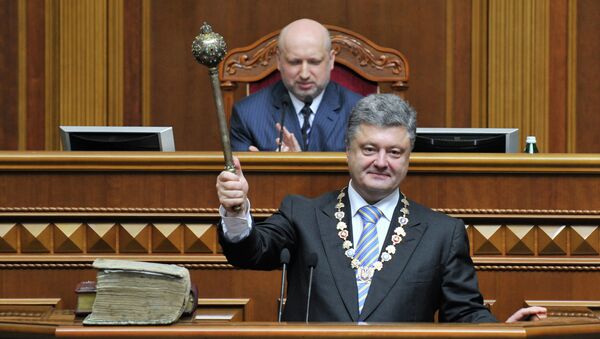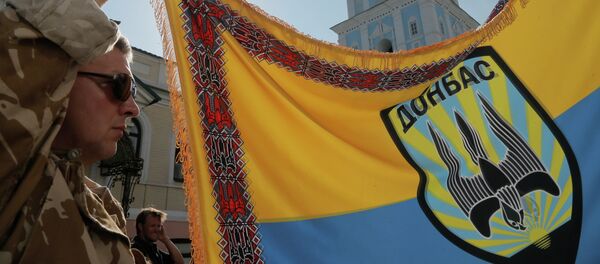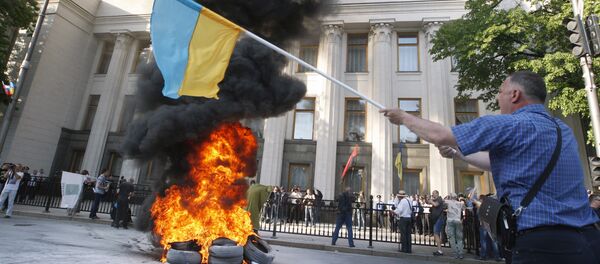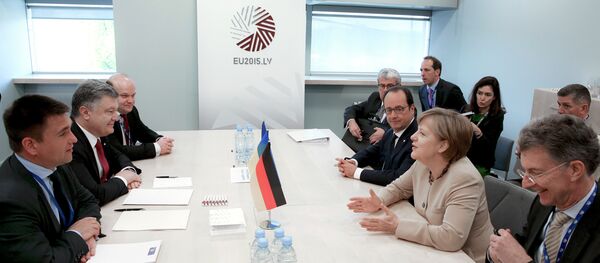The presidential poll was marred by political violence and threats against the campaigns of several prominent 'anti-Maidan' candidates, including independent candidate Oleg Tsarev, Party of Regions candidate Mikhailo Dobkin and Communist candidate Petro Symonenko, each of whom were forced to drop out of elections. Tsarev and Dobkin personally faced repeated attacks and beatings. The election was further blemished by the fact that the militia-held regions in the newly declared Donetsk and Lugansk People's Republics boycotted the elections. For its part, Crimea had broken off from Ukraine completely and joined Russia two months earlier.
Despite the setbacks, Poroshenko made a number of grandiose promises. These included promises to find a speedy end to the conflict in Donbass, to restore Ukraine's territorial integrity, to carry out a thorough-going anti-corruption campaign, to raise wages and pensions, and to solidify 'Maidan's choice' for the European path of development.
The Long War in Eastern Ukraine
During the first very press conference following the election, Poroshenko promised that the "anti-terrorist operation" in eastern Ukraine launched in mid-April "cannot and will not last two or three months. It has to, and will, last for hours."
First promising a quick war to resolve the problem, Poroshenko was forced to backtrack on his promises by mid-summer, when the Ukrainian military offensive bogged down in fighting against anti-Maidan federalists. The increasingly brutal civil war continued to swallow up the lives of military personnel and civilians alike until February 2015, when a fragile ceasefire was enforced via the Minsk Protocol. The agreement envisions the DPR and LPR returning to Ukraine in exchange for federalization, meaning more autonomy for Ukraine's regions, a prospect which Kiev has remained reluctant to commit to.
It is now believed that over 6,250 Ukrainians, among them thousands of civilians, have been killed in the country's civil war, with hundreds of thousands more externally or internally displaced. Over 800,000 Ukrainians have sought asylum or permanent residence in Russia and Belarus, with thousands more attempting to flee to other European countries.
The Stalled Battle Against Corruption
Despite promises to carry out a comprehensive battle against corruption, Ukraine's anti-corruption campaign has stalled, with Poroshenko himself criticized for following in the footsteps of his predecessor and appointing acquaintances and friends to key government posts.
Recently commenting on the much-touted campaign to carry out a reform of the country's civil service, Ukrainian news and analysis hub Apostrof noted that "unfortunately, in a year's time, the president has not been able to fulfill his promise. Ukraine continues to see the functioning of a post-Soviet, subservient and passive civil service. Political and administrative positions have not been separated, an independent civil service authority of state secretaries in accordance with European standards has not been formed. The sign that no effective changes have been made is evidenced by the fact that the system managed to swallow up and spit up in two-three months' time most of the new managers coming from business."
Ultimately, Apostrof argues that when it comes to the civil service, "the main problem at the moment is the obvious lack of political will to create a civil service which is truly independent from the influence of political parties," a problem which has plagued Ukraine since the early 1990s.
Commenting on the law on lustration, passed in September 2014 and aimed at ridding the country of its Viktor Yanukovych-era bureaucrats, Apostrof noted that the law has done more to violate the principles of the presumption of innocence and equality before the law "than to result in a true 'cleansing of power'." The newspaper stated that the campaign, which has removed about 2,000 persons from their posts, has not even managed to clean out all the Yanukovych loyalists, much less deal with the problems of officials being unable to account the discrepancy between their official income and their wealth.
Poroshenko has not been able to break the authority of the oligarchs over Ukraine, and on the contrary, has increased it to the point where some have been able to create their own virtual fiefdoms, complete with regional political control and private armies in the form of volunteer territorial battalions. Pondering the results of the events of the Euromaidan on the one year anniversary of its success, independent Russian journalist Maksim Kononenko argued that "if a year ago, Ukraine was a poor country controlled by oligarchs," now, "a year later, it is a destitute country, controlled by the same oligarchs, one of them even becoming president."
Still the King of Chocolate
A year on, Poroshenko continues to drag the process out, refusing to sell the television station under the guise of national security, and hanging on to the confectionary company Roshen, which continues to operate in Russia, and even has a factory there. In the midst of Ukraine's economic downturn, Poroshenko's assets have made a healthy profit, with Roshen alone seeing a nine-fold increase in profits in 2014. Elements of Ukraine's media have grumbled that even if the president does eventually sell his business empire, there are no guarantees that he may simply squirrel away his assets in offshore safe havens for repurchase later on down the road.
Economy on the Verge of Bankruptcy
Carried to power on a platform of "comfortable living" and a fight against poverty, Poroshenko's Ukraine has seen wages and pensions frozen, unemployment creeping up, the country's currency undergoing a dramatic collapse, all while prices for basic necessities, including food and utilities rates have skyrocketed. Meanwhile, under pressure from the EU and the IMF to carry out austerity reforms, including cuts in government services and subsidies, Ukraine now faces projected cuts in the government sector by up to 20 percent in 2015.
Poroshenko's Successes? A New Parliament and the EU Association Agreement
Poroshenko did live up to his promise of seeing a new parliament elected, calling elections in October, 2014 to replace the Yanukovych-era parliament elected in 2012. However, like the presidential elections held six months before, the legitimacy of the elections was put into doubt by intimidation and low turnout. Much of the former ruling Party of Regions had been systematically purged from the body in the run-up to the election, while the country's Communist Party was ejected completely by presidential decree. The new parliament saw the predictable victory of several newly formed alliances which had played a much more limited role prior to Maidan, including the so-called Petro Poroshenko Bloc, Arseniy Yatsenyuk's People's Front, and the Self Reliance Party of Lviv mayor Andriy Sadovyi. As with the presidential elections, the territories under control of the DPR and the LPR did not participate in the elections.
Analysts have pointed out that the tone of the EU's relationship with Ukraine under the Association Agreement was possible to predict from the beginning, with the draft document not even translated into the Ukrainian language. With Ukraine already exhausting many of its agricultural trade quotas for 2015 earlier in the year, analysts have questioned the economic viability of seeing closer agricultural association with a market already overflowing from high-quality, heavily subsidized food products, while facing ever-growing losses in other markets, including Russia, with which Ukraine has traditionally traded not only in food, but also in machine-building and advanced engineering products, including airplane, helicopter and rocketry components.
Ukrainians' Disenchantment in Their President
An opinion poll published ahead of the one year anniversary of Poroshenko's election by Ukrainian internet opinion polling agency TNS Online Track has found that 51 percent of Ukrainians are now 'totally' or 'mostly' unsatisfied with the president's performance, compared with only 17 percent who are 'partially' or 'completely' satisfied. The poll confirms earlier trends published by market research firm Research & Branding Group, which found that 58 percent of Ukrainians disapproved of the president, with 19 percent saying that they would likely vote for him again, while a full 30 percent, nearly a third of respondents, said that they would vote 'against all' or simply stay home. The figures present a scathing indictment of a president who will soon mark one year in office, and who came to power on a wave of hope for peace, prosperity and a bright European future.






